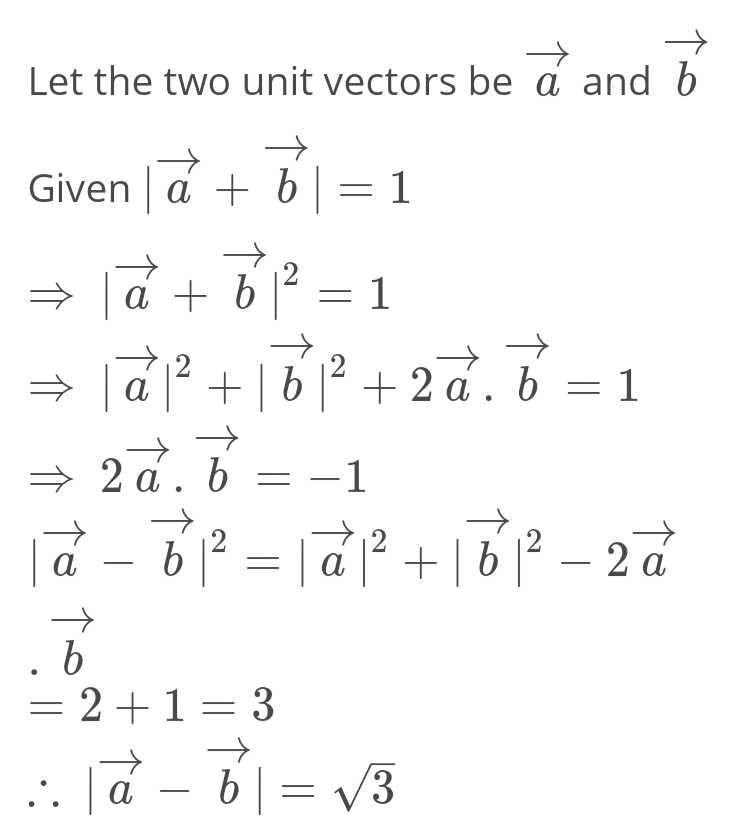Class 11 Exam > Class 11 Questions > The sum of two unit vectors is a unit vector....
Start Learning for Free
The sum of two unit vectors is a unit vector. The difference of the two unit vectors is of magnitude ?
Most Upvoted Answer
The sum of two unit vectors is a unit vector. The difference of the tw...

Community Answer
The sum of two unit vectors is a unit vector. The difference of the tw...
Explanation of Sum and Difference of Unit Vectors
Sum of Two Unit Vectors
Let us assume that two unit vectors are represented by a and b, then their sum is:
a + b = c
As per the question, c is also a unit vector:
|c| = 1
Therefore, we can write:
|a + b| = 1
Squaring both sides:
(a + b) . (a + b) = 1
Expanding the equation:
|a|² + 2a . b + |b|² = 1
Since a and b are unit vectors, we can write:
|a|² + 2a . b + |b|² = 1 + 1
Or,
2 + 2a . b = 2
Therefore, a . b = 0
This shows that the two unit vectors are perpendicular to each other.
Difference of Two Unit Vectors
Let us assume that two unit vectors are represented by a and b, then their difference is:
a - b = c
As per the question, we need to find the magnitude of c:
|c| = |a - b|
Using the distance formula, we can write:
|a - b| = √[(a₁-b₁)² + (a₂-b₂)² + (a₃-b₃)²]
As both a and b are unit vectors, their magnitude is 1:
Therefore,
|a - b| = √[(1-1)² + (1-1)² + (1-1)²]
Or,
|a - b| = √[0] = 0
Therefore, the magnitude of the difference of two unit vectors is 0.

|
Explore Courses for Class 11 exam
|

|
Similar Class 11 Doubts
Question Description
The sum of two unit vectors is a unit vector. The difference of the two unit vectors is of magnitude ? for Class 11 2025 is part of Class 11 preparation. The Question and answers have been prepared according to the Class 11 exam syllabus. Information about The sum of two unit vectors is a unit vector. The difference of the two unit vectors is of magnitude ? covers all topics & solutions for Class 11 2025 Exam. Find important definitions, questions, meanings, examples, exercises and tests below for The sum of two unit vectors is a unit vector. The difference of the two unit vectors is of magnitude ?.
The sum of two unit vectors is a unit vector. The difference of the two unit vectors is of magnitude ? for Class 11 2025 is part of Class 11 preparation. The Question and answers have been prepared according to the Class 11 exam syllabus. Information about The sum of two unit vectors is a unit vector. The difference of the two unit vectors is of magnitude ? covers all topics & solutions for Class 11 2025 Exam. Find important definitions, questions, meanings, examples, exercises and tests below for The sum of two unit vectors is a unit vector. The difference of the two unit vectors is of magnitude ?.
Solutions for The sum of two unit vectors is a unit vector. The difference of the two unit vectors is of magnitude ? in English & in Hindi are available as part of our courses for Class 11.
Download more important topics, notes, lectures and mock test series for Class 11 Exam by signing up for free.
Here you can find the meaning of The sum of two unit vectors is a unit vector. The difference of the two unit vectors is of magnitude ? defined & explained in the simplest way possible. Besides giving the explanation of
The sum of two unit vectors is a unit vector. The difference of the two unit vectors is of magnitude ?, a detailed solution for The sum of two unit vectors is a unit vector. The difference of the two unit vectors is of magnitude ? has been provided alongside types of The sum of two unit vectors is a unit vector. The difference of the two unit vectors is of magnitude ? theory, EduRev gives you an
ample number of questions to practice The sum of two unit vectors is a unit vector. The difference of the two unit vectors is of magnitude ? tests, examples and also practice Class 11 tests.

|
Explore Courses for Class 11 exam
|

|
Signup to solve all Doubts
Signup to see your scores go up within 7 days! Learn & Practice with 1000+ FREE Notes, Videos & Tests.





















